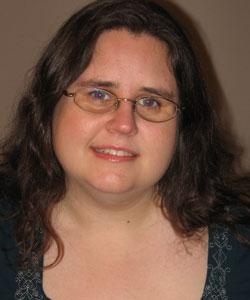Kristen M. Kennedy
 The University of Texas at Dallas
The University of Texas at Dallas
http://bbs.utdallas.edu/people/detail.php5?i=1061
What does your research focus on?
I am most generally interested in brain-behavior relationships as we age, or the cognitive neuroscience of aging. Specifically, I study how changes to the brain’s structure with age correspond to the changes we see in cognition as we age. Interestingly, there is not a one-to-one relationship in this process because our brains are malleable to cope with the biological effects of aging, and our cognitive strategies may also re-arrange to cope with decrements to brain structure. My research focuses on how these processes are related in the course of normal aging and how we build upon our strengths as we age.
What drew you to this line of research and why is it exciting to you?
I was broadly interested in psychology in college and then while studying for a master’s in clinical neuropsychology, I realized that it was the workings of the human brain that I was most interested in pursuing as a research focus. As people are now living to be older and older, it seemed like an exciting opportunity to study how our neural and cognitive abilities could keep pace with this extended lifespan. It is very rewarding research to study the factors that influence the aging of the brain and how they, in part, determine how well we are able to age cognitively.
Who were/are your mentors or scientific influences?
I have been very fortunate to have great teachers and mentors from the very beginning of my academic training. My undergraduate psychology professors at Hendrix College (namely Drs. Chris Spatz, Ralph McKenna, and Tim Maxwell) are some of the best teachers from whom I have had the privilege of learning. Honing my critical thinking skills at a small liberal arts college had an enormous influence on my scientific development, even before I had narrowed down my research focus.
My graduate advisor at Wayne State University, Dr. Naftali Raz, was enormously influential in shaping my scientific thinking and method development. His unwavering rigor in his approach to conducting science will always be my model. He is one of those extraordinary people that just being around them imparts knowledge. I hope that my students can learn as much from me as I did from him.
Finally, it was my postdoctoral mentor, Dr. Denise Park, who helped me integrate all the parts necessary to be a successful, well-rounded scientist. She is one of those rare people who really gets the “big picture” of science, from funding to article publication. Working with her allowed me to integrate a bigger picture view into my day-to-day life, and her training in navigating the world of grant writing and funding was invaluable.
What’s your future research agenda?
I am currently funded for the next three years by a K99/R00 grant from the National Institute on Aging, to investigate the role of brain structure in explaining brain function differences we observe in the course of normal aging. Specifically, this research involves investigating the role of white matter in the reorganization of age-related brain function using structural and functional imaging techniques. Ultimately, I am interested in understanding how the brain changes with age, both adaptively, and detrimentally, and how this knowledge might be used to stave off cognitive decline. My current projects are focused on combining diffusion tensor imaging, to measure the integrity of the white matter connections in the brain, with functional MRI, to explore the neural correlates of age-related alterations in brain activity we see regularly in neuroimaging studies. An ultimate goal of these projects is to determine if these alterations are facilitative or detrimental to cognitive performance.
What publication are you most proud of?
Kennedy, K. M., Rodrigue, K. M., Devous, M. D., Sr., Hebrank, A. C., Bischof, G. N., & Park, D. C. (2012). Effects of beta-amyloid accumulation on neural function during encoding across the adult lifespan. NeuroImage, 62, 1–8.
I chose this publication because it represents the work of a large team of people; I am proud and excited to have been able to coordinate with a team of great researchers, and to integrate different neuroimaging techniques to answer an important question about how biomarkers of neural health impact our neural function across the lifespan.





APS regularly opens certain online articles for discussion on our website. Effective February 2021, you must be a logged-in APS member to post comments. By posting a comment, you agree to our Community Guidelines and the display of your profile information, including your name and affiliation. Any opinions, findings, conclusions, or recommendations present in article comments are those of the writers and do not necessarily reflect the views of APS or the article’s author. For more information, please see our Community Guidelines.
Please login with your APS account to comment.